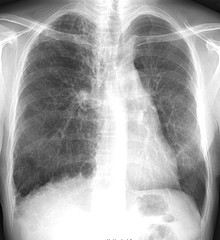Optimistic about lungs - Nihilistic no more about lung cancer
 Nihilistic no more about lung cancer-treating the lung cancer patient optimally and effectively
Nihilistic no more about lung cancer-treating the lung cancer patient optimally and effectivelyWE approached the patient with advanced lung cancer nihilistically until about 10 years ago. Back in the sad old days, the patient was largely given what was euphemistically called "best supportive care".
Often, all that meant was paiukillers and a comforting hug.
Today, the situation is quite different, Buoyed by the positive effects oftbe anti-cancer agent, cisplatiuum, 20 years ago, many clinical trials were launched to search for new cancer drugs or new combinations of drugs.
Today, patients with advanced lung cancer live longer and live better. This is all thanks to the scientific endeavour of researchers and clinicians working in cooperation and in concert with pharmaceutical companies.
But first, a word about early lung cancer. "Early" lung cancer implies that cure is a realistic goal.
Unfortunately, only about 10% of lung cancer can be considered early. Staging is all-important. To stage is to determine the extent of the cancer in the lung and whether it has spread to a distant site.
The PET/Whole Body CT Scan is indispensable in distinguishing early from advanced lung cancer. When there is doubt even with a sophisticated tool like PET/Whole Body CT, we can use an ultrasound guided technique via the trachea (windpipe) or oesophagus (food pipe) to sample any suspicious lymph node lying deep inside the chest. If the lymph node is involved with cancer, surgery is out.
The patient with lung cancer can then be assigned one of the following stages: 1, II, IIIA, IIIB and IV. For Stages l & II, the treatment is surgery followed by chemotherapy. For Stages Ilia & early IIIB, it is a combination of chemotherapy and radiotherapy.
Unfortunately, 90% of lung cancer patients will be found to have Stage IIIB or Stage IV disease i,e, what we call advanced lung cancer. This is the group of patients where there are many stirrings of new effective treatments. This is the group of patients which this article is all about.
Three sets of drugs are routinely used to treat advanced lung cancer namely
1. The monoclonal antibodies, bevacizumab (Avastin) and cetuximab (Erbitux) 2. The tyrusine kinase inhibitors, gefitinib (lressa) and erlotinib (Tarceva) 3. Conventional cytotoxic agents e.g. cisplatinum, carboplatin, docetaxel, paclitaxel,gemcitabine, vinorelbine, pemetrexed
It is good to have so many drugs and so many combinations of drugs. Patients with advanced lung cancer come in different
shapes and sniffles. They have different expectations and pockets.
Some are fit and can withstand a more robust treatment, for example, a combinations of two or three drugs.
Other patients may be less well and only one drug should be used.
And to each patient, I say "We have something to prolong your life and something to give your life quality."
Today, that comforting hug becomes an encouraging embrace. When patients don't do well with first-line treatment (the first set of anti-cancer agents employed) they can often be given effective second-line treatment.
There is even talk of third-line treatment.
Until the day comes when all advanced lung cancer patients can be cured, surely these patients deserve the best that science can offer today.
With the current therapies, patients with advanced lung cancer live, on the average, 12 months instead of eight.
Put another way, 50% of these patients will live a year if they are treated with current protocols instead of a paltry 20% two decades ago. There is always that 5% of patients wholive over three years having undergone two to three optimal lines of chemotherapy.
I write this essay not to announce "Lung Cancer Can Now Be Cured". Of course advanced lung cancer cannot be cured,
My point is that we have moved from therapeutic nihilism to therapeutic enthusiasm. And I believe that this is an important
Rubicon that we have crossed.
I end this essay with a reality check. We turn to pseudoscience (e.g. scalar energy), alternative medicine (qigong) and early Phase I trials (Cytotron) because we fear death.
Nothing is quite so simple and stark as that. But we have to accept that we cannot cure all cancers yet.
And your best bet of staying alive longer and more comfortably is still evidence-based and science-based medicine,
"All of us, among the ruins, are preparing a renaissance beyond the limits of nihilism. But few of us know it."
Labels: Cancer


0 Comments:
Post a Comment
Links to this post:
Create a Link
<< Home